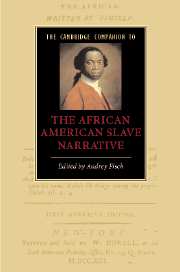Book contents
- Frontmatter
- Introduction
- Part I: The Slave Narrative and Transnational Abolitionism
- 1 The rise, development, and circulation of the slave narrative
- 2 Politics and political philosophy in the slave narrative
- 3 Olaudah Equiano: African British abolitionist and founder of the African American slave narrative
- 4 The slave narrative and the literature of abolition
- Part II: The Slave Narrative and Anglo-American Literary Traditions
- Part III: The Slave Narrative and the African American Literary Tradition
- Part IV: The Slave Narrative and the Politics of Knowledge
- Further Reading
- Index
3 - Olaudah Equiano: African British abolitionist and founder of the African American slave narrative
from Part I: - The Slave Narrative and Transnational Abolitionism
Published online by Cambridge University Press: 28 July 2007
- Frontmatter
- Introduction
- Part I: The Slave Narrative and Transnational Abolitionism
- 1 The rise, development, and circulation of the slave narrative
- 2 Politics and political philosophy in the slave narrative
- 3 Olaudah Equiano: African British abolitionist and founder of the African American slave narrative
- 4 The slave narrative and the literature of abolition
- Part II: The Slave Narrative and Anglo-American Literary Traditions
- Part III: The Slave Narrative and the African American Literary Tradition
- Part IV: The Slave Narrative and the Politics of Knowledge
- Further Reading
- Index
Summary
The most important and most widely published author of African descent in the English-speaking world of the eighteenth century, Olaudah Equiano founded the genre of the African American slave narrative. Writing in 1913, W. E. B. Du Bois recognized Equiano's autobiography as “the beginning of that long series of personal appeals of which Booker T. Washington's Up from Slavery is the latest.” The Interesting Narrative of the Life of Olaudah Equiano, or Gustavus Vassa, the African. Written by Himself (London, 1789) established all of the major conventions reproduced in the vast majority of nineteenth- and twentieth-century factual and fictional African American slave narratives: an engraved frontispiece, a claim of authorship, testimonials, an epigraph, the narrative proper, and documentary evidence.
Equiano writes that he was born in 1745 in what is now southeastern Nigeria. There, he says, he was enslaved at the age of eleven and sold to English slave traders who took him on the Middle Passage to the West Indies. Within a few days, he tells us, he was taken to Virginia and sold to a local planter. After about a month in Virginia he was purchased by Michael Henry Pascal, an officer in the British Royal Navy, who ironically renamed him Gustavus Vassa and brought him to London. Slaves were often given ironically inappropriate names of powerful historical figures like Caesar and Pompey to emphasize their subjugation to their masters' wills. Gustavus Vasa (sic) was a sixteenth-century Swede who liberated his people from Danish tyranny.
- Type
- Chapter
- Information
- Publisher: Cambridge University PressPrint publication year: 2007
- 6
- Cited by

